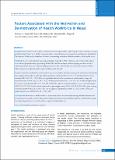Please use this identifier to cite or link to this item:
https://hdl.handle.net/20.500.14356/1843Full metadata record
| DC Field | Value | Language |
|---|---|---|
| dc.contributor.author | Ghimire, J | - |
| dc.contributor.author | Kumal, A B | - |
| dc.contributor.author | Mahato, R K | - |
| dc.contributor.author | Gupta, R P | - |
| dc.date.accessioned | 2023-05-26T06:06:24Z | - |
| dc.date.available | 2023-05-26T06:06:24Z | - |
| dc.date.issued | 2013 | - |
| dc.identifier.citation | Gupta RP,G. J. K. A. M. R. (2013). Factors Associated with the Motivation and De-motivation of Health Workforce in Nepal. Journal of Nepal Health Research Council. https://doi.org/10.33314/jnhrc.v0i0.374 | en_US |
| dc.identifier.issn | Print ISSN: 1727-5482; Online ISSN: 1999-6217 | - |
| dc.identifier.uri | http://103.69.126.140:8080/handle/20.500.14356/1843 | - |
| dc.description | Special Issue Articles | en_US |
| dc.description.abstract | Abstract Background: Health workforce plays an important role in improving the health of people but its shortage is a major problem facing Nepal. This is further compounded by prolonged absence, low motivation, and improper distribution. The objective of the study is to find out the factors determining motivation of health workforce in the public sector. Methods: A cross sectional study was conducted during September, 2012 to February, 2013. The health facilities were selected proportionately representing all the Illakas and then a simple random sampling was done to select individual facilities. Data was collected using questionnaire. The collected data was entered and analyzed in SPSS. Ethical approval was taken from the Nepal Health Research Council. Results: More than a half (55%) of the health workers were satisfied with their current jobs and the financial benefits they acquired. The results revealed that higher age, higher education (OR:2.6; CI:1.414-4.660) and lower service duration (OR:2.567; CI:1.193-3.306) were significant factors for the motivation of health workers along with financial rewards (OR:4.706; CI:2.961-7.478), working environment (OR:2.344; CI:1.507-3.648) and opportunity for capacity development (OR:5.437; CI:3.344-8.840). The major de-motivational factors were: low remuneration (OR:3.215; CI:2.049-5.045), limited capacity developmentopportunity (OR:4.269; CI:2.672-6.821), poor working environment (OR:4.062; CI:2.528-6.526), non-recognition of performance (OR: 2.157; CI:1.389-3.350), and political interferences (OR:2.752; CI:1.754-4.320). Conclusions: Motivation of health workers is an important factor for smooth functioning of health intuitions and increased access to quality services. The good working environment, salary and other financial benefits matter greatly for enhanced performance of health workers along with additional factors. | en_US |
| dc.language.iso | en | en_US |
| dc.publisher | Nepal Health Research Council | en_US |
| dc.relation.ispartofseries | May-Aug, 2013;374 | - |
| dc.title | Factors Associated with the Motivation and De-motivation of Health Workforce in Nepal | en_US |
| dc.type | Journal Article | en_US |
| local.journal.category | Special Issue Articles | - |
| Appears in Collections: | Vol. 11 No. 2 Issue 24 May - Aug, 2013 | |
Files in This Item:
| File | Description | Size | Format | |
|---|---|---|---|---|
| 374-Article Text-398-2-10-20180206.pdf | Fulltext Download | 356.5 kB | Adobe PDF |  View/Open |
Items in DSpace are protected by copyright, with all rights reserved, unless otherwise indicated.
